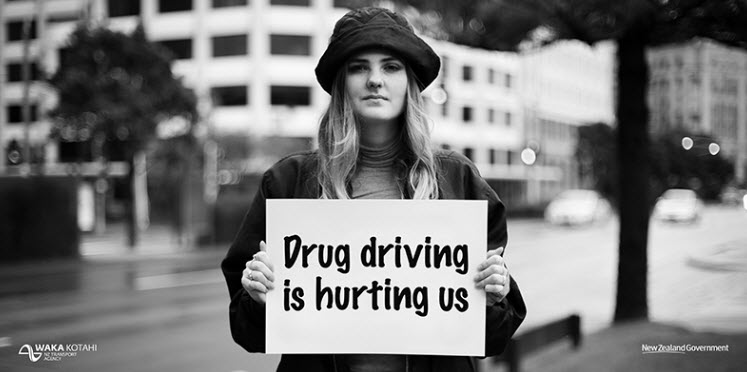Legalising Cannabis Will Make Road Riskier – Even With Testing
 Media Release SayNopeToDope NZ 31 July 2020
Media Release SayNopeToDope NZ 31 July 2020
The SayNopeToDope Campaign is warning that legalisation of cannabis will make our roads more unsafe, and roadside drug testing will do little to mitigate these harms.
“The rights of people to be safe on the road outweighs the right to get high. If a person has THC in their system, we don’t want them on the road endangering other drivers and families. The international research is clear on the harm that legalisation of cannabis will bring to our roads,” says SayNopeToDope campaign spokesperson Aaron Ironside.
In Canada, a quarter of Canadians aged 18 to 34 have driven after consuming cannabis or been a passenger in a vehicle driven by someone under the influence of cannabis, in a new survey released in December (2019) by the Canadian Automobile Association (CAA). 86% of young Canadians said it is important to find alternative ways to get home when they drink alcohol, but only 70% of them believe it is important to do so after using cannabis.
In a study done in New Zealand by six Australian health researchers, it found that habitual users of marijuana have about 10 times the risk of car crash injury or death compared to infrequent or non-users. Those users who crashed had smoked marijuana within three hours of their accidents.”
A study in 2017 by the University of Waikato found that nearly half of Kiwi cannabis users don’t think twice about driving after smoking, and that while nearly three-quarters (73.6%) of drinkers had made a decision not to drive after drinking, only 57% of cannabis smokers had made the same call.
And while many factors contribute to pedestrian fatalities, it turns out that US states that legalised marijuana for medical and/or recreational use saw a 16.4 percent surge in such deaths in the first six months of 2017 compared to the first six months of 2016, while nonlegal states saw a drop of 5.8 percent in pedestrian fatalities over the same time.
Since recreational marijuana was legalised in Colorado, marijuana related traffic deaths increased 151%, more than doubling from 55 in 2013 to 138 people killed in 2017. The percent of traffic fatalities that involved drivers intoxicated with marijuana in Colorado rose by 86% between 2013 and 2017, with over one-fifth of all traffic fatalities involving a driver testing positive for marijuana by 2017.
According to AAA, Washington State experienced a doubling in drugged-driving fatalities in the years following legalisation. The number of fatally injured drivers positive for marijuana in the state more than doubled following marijuana legalisation, reaching 17% in 2014. The latest AAA Foundation research (2020) found that between 2008 and 2012 – the five-year period before the drug was legal – an estimated 8.8% of Washington drivers involved in fatal crashes were positive for THC. That rate rose to 18% between 2013 and 2017. In Massachusetts, marijuana is the most common drug found in drivers involved in fatal Massachusetts crashes. Cannabis was found in 175 — 31% — of the 572 drivers involved in fatal crashes from 2013 to 2017, according to the Executive Office of Public Safety and Security.
Nick Leggett who is the CEO of the Road Transport Forum recently wrote in transporttalk: “Already the number of people being killed by drug impaired drivers on New Zealand roads is higher than those killed by drivers above the legal alcohol limit. There have been years and years of media campaigns to stop people drinking and driving, but still they do it. So, what is planned to educate people on taking drugs and driving? Higher risk on the roads automatically means higher insurance premiums across the board – insurance is risk priced and you pay on probability… We don’t want New Zealand’s truck drivers, who are just going about their work delivering all New Zealanders the goods they need, to be the casualty of poorly thought out laws.”






